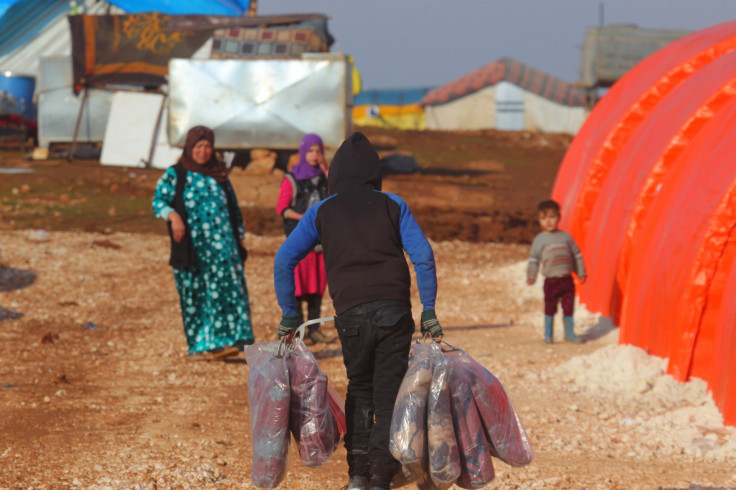The UK has committed £3.8 billion to the Syria Crisis in 12 years
The UK pledges a further £150 million to the people seeking humanitarian assistance in Syria. Over 12 years, the UK has contributed around £3.8 billion to support the people affected by the largest refugee crises in the world.

In 2023, the UK pledged almost £200 million to the Syria region. Months ago, the government revealed that the UK committed nearly £43 million in response to the earthquakes that devastated parts of Syria and Türkiye. The recent funding brings the UK's contribution to Syria and the Syria region up to £193 million so far in 2023.
Today (Thursday 15 June), the UK has provided Syria with a further £150 million at the 'Supporting the Future of Syria and the Region' pledging conference in Brussels. The £150 million fund will be put towards supporting "millions of vulnerable Syrians and help mitigate the destabilising impact of the conflict in refugee-hosting nations".
This announcement comes after President Erdoğan of Turkey revealed his plans to send one million refugees back to their homeland in 2023.
"The international community must ensure that the Syrian people are not forgotten", the Minister of State for the Middle East, Lord (Tariq) Ahmad of Wimbledon declared.
Prior to the additional funding from the UK to Syria and the region, the Foreign and Commonwealth Office called for humanitarian efforts to be doubled, if the displaced people are to return to Syria.
The further £150 million contribution to Syria will also provide the humanitarian response teams, that are currently in and around the region, with financial support. The fund will also support almost 65,000 of the 15.3 million people from Syria who are currently seeking humanitarian aid.
According to Save the Children, a charitable organisation that is currently supporting internally displaced people in Syria, 75 per cent of the people in need of humanitarian assistance are women and children.
"I hope the war ends in #Syria & we return to our normal life & to our schools & that every child who has been deprived of education returns to school" Wafaa*,19
— Save the Children International (@save_children) June 15, 2023
Education is a right no child should be denied
Urgent funding is needed to give kids a hopeful future #SyriaConf2023 pic.twitter.com/khPlDy9Djs
The additional pledge will allow access to primary education services, in addition to sexual and reproductive services in Northwest Syria.
According to the Assessment of Findings of the Humanitarian Needs Overview, the long-lasting effects of COVID-19 – in addition to the food and water crises in the region, have escalated the number of gender-based violence cases against women and girls in Syria throughout 2022.
People who have been affected by, and survived, gender-based violence will also receive assistance with recovery.
The Minister of State for the Middle East also noted that in addition to the "12 years of harrowing conflict", displaced people from Syria have faced further tragedies this year – with reference to the Syria and Türkiye earthquakes.
Last year's earthquake relief fund, which stood at £43 million, contributed to immediate support towards the White Helmets emergency search and rescue operations. There was an influx of blankets, family tents, relief items, water purification kits, and food packages distributed to the victims.
Our 'humanitarian kitchens' and food delivery, supported by @HungaryHelps, remain important following the earthquake in @Syria. In many places, including in parts of Latakia and Aleppo, they still provide fundamental services#Hungary #máltaiszeretetszolgálat pic.twitter.com/gTJZb5H8LF
— Solymári Dániel (@solymaridaniel) June 10, 2023
Overall, the UK pledged over £160 million to those seeking support in Syria in 2022. Syria received funds from the UK that provided thousands of people in Syria with formal education services, access to drinking water, and immunisation campaigns.
Last year's contribution also made for increased access to medical consultations, together with additional access to gender-based violence, sexual, and reproductive services.
Since the start of the Syrian Civil War in 2011, numerical data shows that the UK has been one of the largest two-sided donors for the humanitarian and refugee crisis – having pledged more than £3.8 billion in the last 12 years.
Although the Syrian Refugee Crisis is the largest in the world, the financial contribution has been labelled by the UK government as: "The UK's largest-ever response to a single humanitarian crisis."
The Minister of State for the Middle East spoke of his gratitude towards the pledge. He stated: "The UK's commitment to supporting the Syrian people is unwavering."
The Minister of State for the Middle East concluded: "The UK will continue to play a leadership role in supporting Syrians to rebuild their lives and promote a long-term political settlement for lasting and sustainable peace."
© Copyright IBTimes 2025. All rights reserved.






















